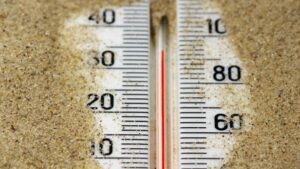Post-doctoral fellowship In Physical Oceanography
Assessing the planetary heat redistribution in the ocean
Assessing the planetary heat redistribution in the ocean
Contexte
Subject area
Physical oceanography, air-sea interactions, global warming, climate change, extreme events, marine heat waves.
Subject description
The European Horizon2030 project Ocean observations and indicators for climate and assessments (ObsSea4Clim: https://obssea4clim.eu), has been funded to deliver an improved framework for nations’ contributions to European ocean observations of Essential Ocean and Climate Variables (EOVs/ECVs) in support of regional and global climate assessments, projections and actionable indicators for sustainable development. The ObsSea4Clim strategy is to achieve this overarching goal by analyzing different ocean climate application areas. One of these, “Ocean warming and marine heat waves” has a major scientific and societal impacts.
Ocean warming is a particularly important indicator for monitoring planetary warming. Terrestrial weather patterns and climate are determined by the amount and distribution of solar radiation incident on our planet. To maintain a climate (statistical) equilibrium, the radiation leaving the Earth system towards space must equal the solar radiation absorbed, although numerous atmospheric, oceanic and terrestrial phenomena interact to couple these fluxes.
Solar radiation can be diffused, reflected or absorbed by the atmosphere and the Earth’s surface, where it is then transformed into heat, latent, potential and kinetic energy, before being re-emitted to space as long-wave radiation. This energy can be stored, transported and converted, generating various meteorological and oceanic phenomena. Today, human activities are perturbing this energy balance in unprecedented ways, with the ocean playing a central role in this disruption. More energy is entering the climate system than is leaving it, leading to an imbalance known as the Earth Energy Imbalance (EEI). Consequently, heat is accumulating in the Earth’s system. Approximately 90% of this excess heat is stored in the ocean, measured in terms of ocean heat content. Measuring how fast and how much heat is accumulated in the Earth’s system allows us to quantify the current state and future perspectives of global warming. Moreover, it enables us to better quantify and predict changes in the entire climate system due to global warming, and to measure if global warming is accelerating (Minière et al., 2023; Storto et al., 2024).
The Global Energy Cycle (through which the EEI is assessed) and its ocean component, the ocean heat content, are Global Climate Observing System (GCOS) key indexes (and the ocean heat content is a GCOS indicator). Their evaluation is based on different EOVs/ECVs. Due to the scarcity of EOVs and ECVs, there is still unclarity regarding variations in both the EEI and ocean warming.
For example, most recently, several studies have emphasized a doubling of the EEI, and its cause remains a matter of scientific controversy (von Schuckmann et al., 2020; 2023; Loeb et al., 2021). Some authors suggest that this change in the EEI could be a foresight of underestimated planetary warming Raghuraman et al., 2021; Hansen et al., 2023). Hence, there is an urgent need to unravel the role of the ocean in determining variations, timescales and perspectives of future planetary warming.
At the same time, the surface temperature of the ocean has been rising, with extreme periods occurring more frequently over the past two decades. These are known as marine heat waves (MHWs) (Frölicher et al., 2018). We do not yet know the extent and depth of such events, nor do we know their connection to the atmosphere in terms of drivers and impacts. Nevertheless, these extreme warming events have been documented to have significant impacts on marine ecosystems (Smale et al., 2019; Smith et al., 2023), along with human well-being and regional economies (Holbrook et al., 2022).
Both the increase and acceleration of ocean heat content , as well as the occurrence of MHWs, affect not only regional temperature increases and variability but also ocean stratification, which has an even stronger impact on marine ecosystems and ocean biogeochemical cycles. This post-doc is aiming to further clarify the role of planetary heat redistribution in the ocean, particularly by considering the ocean as a fundamental driver in determining the timescales of global warming and climate inertia. It also seeks to unravel the key regions of heat penetration from the upper active ocean layer to the abyss, and to understand the eventual preconditioning or co-occurrence of ocean heat content increase over large depth, MHWs and ocean stratification. Results of this study would allow us to evaluate the timescales of inertia in the ocean energy system, the preconditioning of MHWs, impacts on ocean stratification, and consequently, the climate response time to changes in anthropogenic emissions (i.e. net-zero policies). This understanding is essential for adaptation strategies and management.
PhD supervisor
Prof. Sabrina Speich (, https://www.lmd.ens.fr/speich/)
Laboratoire de Météorologie Dynamique – IPSL
École normale supérieure – PSL
45 rue d’Ulm
75231 Paris Cedex 05, France
Co-supervisor
Dr. Karina von Schukmann (Mercator Ocean International, Toulouse: )
Description
Particularly, this post-doc proposition is aiming to:
- Analyze critical areas of regional heat accumulation and transport, and determine their drivers of change (e.g., stratification) under global warming. A starting point will be the Atlantic Ocean which has been identified as one of the major regions of ocean warming (e.g., Cheng et al., 2023; Li et al., 2023).
- Identify the most critical areas and processes (e.g., climate variability such as ENSO, role of marine heat waves) in the redistribution of heat into the deep ocean layers, and how this has changed over the past decades.
- Deepen our understanding in characterizing the warming across different water layers and identify changes in ocean warming at isopycnal layers to distinguish between upper layers/shallow tropical systems, the subtropics (thermocline waters), the subpolar (intermediate mode waters) and the polar regions (deep and abyssal waters).
- Enhance our understanding on changes (e.g., reduction) in the ocean heat sink capacity linked to ongoing global warming (e.g., changes in stratification).
The working environment
The École normale supérieure (ENS: https://www.ens.psl.eu/en) is home to 800 researchers and lecturers, 300 post-doctoral researchers and 600 doctoral students. It hosts 32 research units in the humanities and sciences, covering a very broad scientific field at the highest international level. As part of the Université Paris Sciences et Lettres, the Ecole normale supérieure promotes fundamental research that expands the frontiers of knowledge while facilitating and encouraging its exploitation. Its research is structured in a dynamic way to anticipate and support the latest developments in the most advanced fields of science and to promote multidisciplinary initiatives. Strong research and attractive study programmes attract researchers and students from around the world. With new knowledge and new perspectives, the Ecole normale supérieure contributes to a better future.
The Laboratoire de Météorologie Dynamique (LMD: https://www.lmd.ipsl.fr/en/home-2/) studies climate, planetary atmospheres and the ocean by combining theoretical approaches, instrumental developments for observation and numerical modelling. It is at the forefront of research on the dynamic, physical and biogeochemical processes enabling the study of the evolution and forecasting of ocean, meteorological and climatic phenomena. The LMD is clearly positioned both on fundamental research on the processes, dynamics and biogeochemistry of the ocean, atmosphere and climate, and on finalized research, particularly on questions relating to the anticipation of global warming and its consequences.
The LMD has an interdisciplinary width that includes marine biology, marine chemistry, oceanography, and experts on the dynamics and physics of the atmosphere. Our scientists and students often have prominent roles in international project, from Antarctica, Arctic, and the great world seas, atmosphere and climate.
Contact information
If you have any questions about the position, please contact Prof Sabrina Speich,
Application
Submit your application by email to
The application should be sent in French or English and contain:
- A one page cover letter outlining your ambitions for the outlined position and relevance to
the position description must be included. - ID
- CV
- Copy of diplomas
Applications must be received by: 2024-07-25
Information for International Applicants
Choosing a career in a foreign country is a big step. Thus, to give you a general idea of what we and Paris have to offer in terms of benefits and life in general for you and your family/spouse/partner please visit: https://www.ens.psl.eu/en/campus-life-paris
The ENS works actively to achieve a working environment with equal conditions, and values the qualities that diversity brings to its operations.
Salaries are set individually at the ENS.
In connection to this recruitment, we have already decided which recruitment channels we should use. We therefore decline further contact with vendors, recruitment and staffing companies.
References
- Frölicher, T. L., Fischer, E. M. & Gruber, N. Marine heatwaves under global warming. Nature 560,
360–364 (2018) - Hansen, J.E., , Makiko Sato, Leon Simons, Larissa S Nazarenko, Isabelle Sangha, Pushker Kharecha,
James C Zachos, Karina von Schuckmann, Norman G Loeb, Matthew B Osman, Qinjian
Jin, George Tselioudis, Eunbi Jeong, Andrew Lacis, Reto Ruedy, Gary Russell, Junji Cao,
Jing Li, Global warming in the pipeline, Oxford Open Climate Change, Volume 3, Issue
1, 2023, kgad008, https://doi.org/10.1093/oxfclm/kgad008 - Holbrook, N. J. et al. Impacts of marine heatwaves on tropical western and central Pacific Island
nations and their communities. Glob. Planet. Change 208, 103680 (2022). - IPCC, 2021 : Summary for policymakers. In Climate Change 2021: The Physical Science Basis.
Contribution of Working Group I to the Sixth Assessment Report of the
Intergovernmental Panel on Climate Change (eds Masson-Delmotte, V. et al.) 3–32
https://doi.org/10.1017/9781009157896.001 (Cambridge University Press, 2021). - Li, Z., England, M.H. & Groeskamp, S. Recent acceleration in global ocean heat accumulation by
mode and intermediate waters. Nat Commun 14, 6888 (2023).
https://doi.org/10.1038/s41467-023-42468-z - Loeb, N. G. et al. Satellite and ocean data reveal marked increase in Earth’s heating rate. Geophys.
Res. Lett. 48, e2021GL093047 (2021). - Minière, A., von Schuckmann, K., Sallée, JB. et al. Robust acceleration of Earth system heating
observed over the past six decades. Sci Rep 13, 22975 (2023).
https://doi.org/10.1038/s41598-023-49353-1 - Raghuraman, S. P., Paynter, D. & Ramaswamy, V. Anthropogenic forcing and response yield observed
positive trend in Earth’s energy imbalance. Nat. Commun. 12, 4577 (2021). - Smale, D. A. et al. Marine heatwaves threaten global biodiversity and the provision of ecosystem
services. Nat. Clim. Change 9, 306–312 (2019). - Smith, K. E. et al. Biological Impacts of Marine Heatwaves. Annu. Rev. Marine Sci. 15, 119–145
(2023). - Storto, A., Yang, C. Acceleration of the ocean warming from 1961 to 2022 unveiled by largeensemble
reanalyses. Nat Commun 15, 545 (2024).
Compétences requises
Postdoctoral profile
We are seeking a highly motivated candidate with a PhD’s degree in physical oceanography, atmospheric sciences, or a related field. Applicants from physical or mathematical disciplines with an interest in climate science are also welcome.






